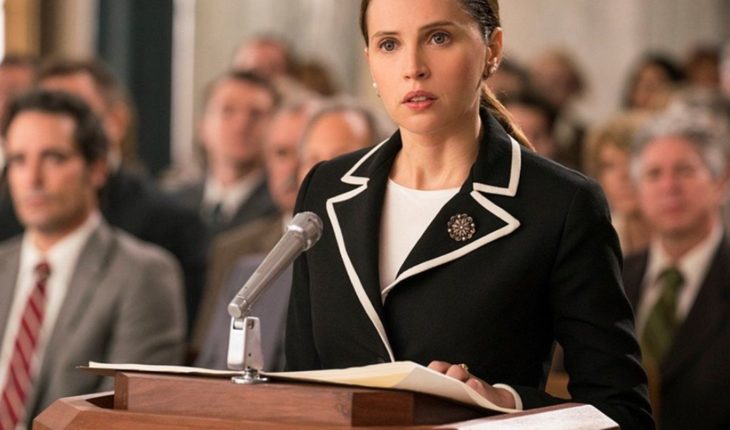this Thursday, March 7, and in the lobby of the international women’s day, came to all “Equal voice” cinemas, the film directed by Mimi Leder (“string d”) (e favors”,”Deep impact”) and starring Felicity Jones and Armie Hammer.
The plot is based on the true story of Ruth Bader Ginsburg, a member of the Supreme Court of the United States American judge. In each scene, the film runs through the road that had to go through to become a lawyer, and all the prejudices which had to deal. Despite the fact that the story is set in 1956, and the situation changed with the passage of the years, today women still suffer discrimination in the flesh within the scope of the right. To expand on that idea, in Filo.News you have in detail some scenes of the film – no spoilers – and Word Melisa García and Melina Gonzalez, co-founders of Abofem, who gave details of the scene in the Argentina.El cry of equality photo: Twitter dinner of men marching firmly in unison, road to the first school day at Harvard University. In the midst of this male tide appears Ruth, that breaks through and is imposed to fight for his place. With this significant plane begins the movie, and largely summarizes the message that you want to express: the lack of prominence of women in the law. During the whole film Ruth demonstrates perseverance and character, although prejudice invade it all the time. Own Dean of the prestigious institution asked him: “why are occupying a place that could belong to a man?”. All considered that he was not at the level of work – idea that is reflected when mention you his stature-. Throughout the film, Ruth crosses all obstacles just by their genre: children, the health of her husband, home meal. As if outside, it was criticized twice, not only by being a woman but also because of their religion – Jewish-. But she advances. And it does not surrender. You know that something is changing, and intends to bring to justice a historical case for gender discrimination. It was not easy: “first to change minds and then law”, “the country is not ready”, “it is an exaggeration,” are some of the phrases that the young man had to listen to when you want to stand before the judge. Still gave battle: the revolution had already arrived. This sensation is throbbing in the bowels and sneaks into the new youth; even in his family, since his daughter purchased the revolutionary spirit and puts it to the test. New generations, feminism, equality before the law, these are some of the shafts which presents the film and which summarizes with excellence. With an emphasis on flat details, and with an appropriate accompaniment of music, expresses the situation that all women had to live to enter the legal profession. Women and discrimination in the law: what happens in Argentina?
The “Not one less” by 2015, the contribution of different organizations, including the explosion in social networking: feminism gained momentum in society, in all walks of life, and the judiciary was not left behind. Now, and thanks to the courage and struggle of many women all these years, the situation in Argentina is very different to what presents the film. However, it has some points in common, representing a call of attention and reflection on what still remains to be done, everything that is not. According to the lawyers explained, women suffers discrimination from the moment where he decided to start studying and also at work, where is relegated in cases of maternity or where suffered wage discrimination.” I decided to be a lawyer so that women can access to a just, egalitarian space within what I can and with the tools that I have – stated one of them-, with the passion I do, achieve that goal, do my bit to change realities. But it was not easy, my project life was very sacrificed to be able to access and receive me, as happens to many women”. When he finally entered the judicial system, was found with a whistleblower panorama: “justice without gender mainstreaming. “Happens to us a lot that we are asked to lawyers with that quality, because justice does not (…) is essential a feminist, have gender mainstreaming, empowering women and equality”.
“It is women that must shuttle system and not the reverse, because we do not start from a society where there is gender parity,” they explained.
Both rightly highlighted the case of Tucuman where a girl of 11 years was forced to give birth without your consent, which catalogued as “regrettable”: “makes visible a State that does not respond, that not responsible by the gravity of the situation, not even they provided psychological support for the victim”.” We are a country very rich in what has to do with a gender perspective, the issue is the lack of enforcement, rights that are acquired and that are not known, struggle is putting a blanket of light”, they explained.
“From our place of lawyers, we have to work hard to publicize the laws that are in force,” they said.
Undoubtedly the film arrives during the fair, necessary, where gained momentum at the spectators and made clear the need for the fight of the women. As shown in the plot, not only will be in the streets, but also within the judicial centres.” It is necessary that the fight is from the law because it is the only way to do so at a general level, the legislative function in the creation of regulations that echo in the needs of the people, and I believe that the prevailing need for equality is of public knowledge” concluded. In this note:





